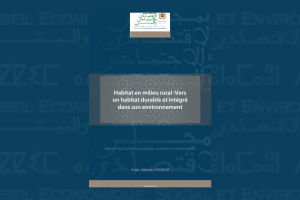
Ce rapport souligne que la situation de l’habitat rural au Maroc se traduit, d’une part, par le développement d’habitats isolés faiblement desservis en services sociaux de base avec peu d’opportunités de développement, notamment d’activités non agricoles et, d’autre part, par la croissance non maîtrisée de centres ruraux émergents ne bénéficiant ni de la planification ni des infrastructures adaptées.
The CESE report on housing in rural areas, developed with interview-based input from 17 governmental and non-governmental actors, was adopted by the unanimous vote of all Council members during the General Assembly’s 89th regular session on 30 August 2018.
A key finding of this report is that villages in rural areas in Morocco are mostly dispersed and split up into several groups of dwellings with poor access to basic social services and little to stimulate economic development, particularly for non-farm economic activities. Another main feature of rural housing in Morocco, the report goes on, is the rapid growth of large numbers of newly emerging rural centers that are unplanned and infrastructure deficient.
The Council’s recommendations in this respect cover the following two main points:
- Address rural housing with a concertedly holistic vision, along with a tailored strategy specifically designed to meet the needs of the various regions. The vision and the strategy are to be developed through a participatory process that takes onboard the contextual perspectives of regional concerns and specific priorities in the matter.
- Put in place a framework to protect agricultural land, especially farmland with the greatest production potential, while ensuring responsible management of land for housing in rural and pre-urban areas.
The following proposals are therefore made:
- Urgently upgrade unplanned rural centers to improve the living conditions of populations.
- Accelerate the processes of resolving land-related issues that mainly affect rural housing (diversity of land ownership status, complexity of administrative procedures and multiplicity of players active in the sector).
- Accelerate widespread use of town planning documents across all regions and adapt all urban development plans to the local context and needs of rural communities (human dwelling places, livestock barns, storage buildings, equipment facilities, etc.) through a participatory approach.
- Support the urban planning of small towns with resources and incentives to enhance wealth and job creation, particularly through the social and solidarity economy (SSE) perspective.
- Diversify and develop the tools and funding mechanisms for rural housing and make the rural housing benefit from the funding mobilized under the Housing and Urban Integration Solidarity Fund and the Rural and Mountain Area Development Fund.
- Integrate training in rural housing into training curricula, particularly at ENA, INAU and vocational training centers.
- Set up capacity-building programs for various housing development actors in rural communities.
- Ensure the necessary mechanisms are in place to help foster local construction innovations and promote the use of the latest territorial building techniques.
- Establish the consultation bodies provided for in the organic laws relating to local authorities, to enabler greater engagement and involvement of all stakeholders in rural housing efforts.
